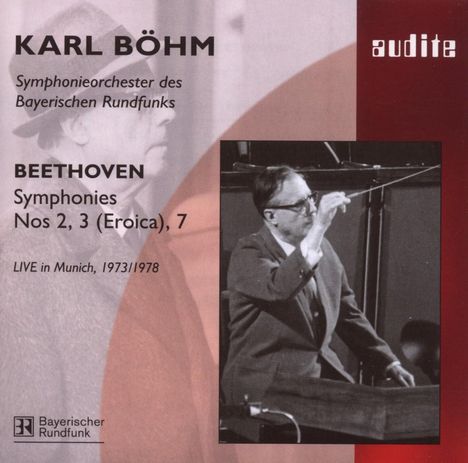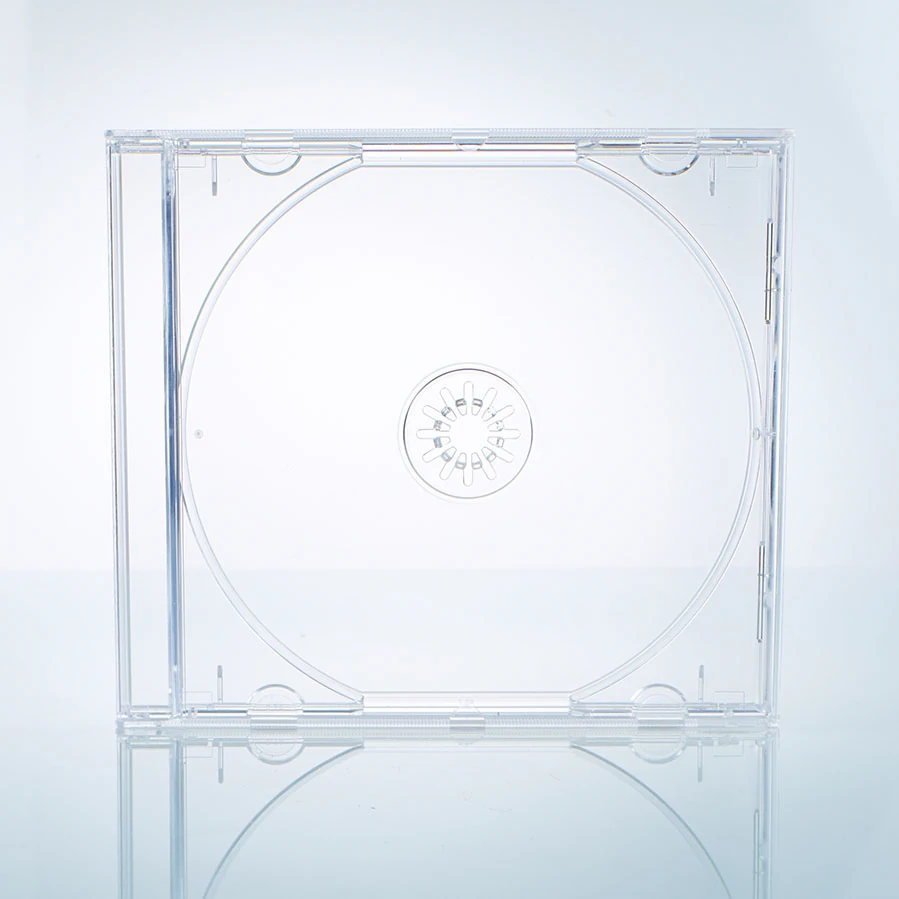Karl Böhm dirigiert auf 2 CDs
Karl Böhm dirigiert
2
CDs
CD (Compact Disc)
Herkömmliche CD, die mit allen CD-Playern und Computerlaufwerken, aber auch mit den meisten SACD- oder Multiplayern abspielbar ist.
Derzeit nicht erhältlich.
Lassen Sie sich über unseren eCourier benachrichtigen, falls das Produkt bestellt werden kann.
Lassen Sie sich über unseren eCourier benachrichtigen, falls das Produkt bestellt werden kann.
- Beethoven: Symphonien Nr. 2, 3, 7
- Künstler:
- Symphonieorchester des Bayerischen Rundfunks, Karl Böhm
- Label:
- Audite
- Aufnahmejahr ca.:
- 1973/1978
- UPC/EAN:
- 4022143234049
- Erscheinungstermin:
- 16.11.2007
Weitere Ausgaben von Karl Böhm dirigiert |
Preis |
|---|---|
| CD | EUR 12,99* |
Karl Böhm galt als Autorität in Sachen Mozart- und Strauss-Interpretation. So gerät fast aus dem Blick, was für eine bedeutende Rolle die Musik Beethovens in seiner Biographie und künstlerischen Laufbahn spielte. Vor allem der Fidelio markiert wichtige Stationen seines Lebens: Fidelio war die erste Oper, die Böhm als Kind erlebte, mit ihr feierte er 1920 seinen ersten durchschlagenden Erfolg, mit ihr eröffnete er das Festival zur Wiedereröffnung der Wiener Staatsoper 1954, und sie war das letzte Werk, das der Staatsoperndirektor Böhm 1956 leitete, bevor er, vom Publikum wegen vermeintlicher Vernachlässigung seiner Pflichten ausgepfiffen, zurücktrat. Böhm selber beschrieb Fidelio als "diese schönste aller Opern, die sich am Schluss zu einem Oratorium der Menschlichkeit ausweitet" und damit eine "ins Jenseitige erhöhende Wirkung" entfaltet. Der humanistisch hohe Ton, der am Ende des Fidelio alle Dramatik aufhebt, kennzeichnet auch die vorliegenden Aufnahmen der Sinfonien Nr. 2, 3 und 7, die Böhm 1973 und 1978 mit dem Sinfonieorchester des Bayerischen Rundfunks einspielte. Sie entstanden nach der Gesamteinspielung zum Beethoven-Jahr 1970, sind also Böhms jüngste Aufnahmen von Beethoven-Sinfonien. Sie überzeugen durch ihre Gelassenheit und Frische, durch den in allen Stimmen sorgfältig modellierten Klang. Beethovensche Kontrastwirkungen werden nicht unterschlagen, sondern kraftvoll aufgefangen. Zugleich zeigt sich Böhms am Musiktheater geschultes Gespür für dramaturgischen Aufbau des Ganzen, das für Lebendigkeit und Schwung der Interpretationen einsteht: Beethovensche Drastik, ins Klassische gewendet. Die erste Böhm-Veröffentlichung bei audite im April 2007 setzte eine Diskussion über die Rolle Böhms in der Nazi-Diktatur in Gang. Ein Diskussionsforum über diese Thematik finden Sie auf den Seiten von klassik. com: Folgen Sie diesem Link und Sie gelangen direkt zum audite-Forum mit dem Titel "Diskussion über die Rolle Karl Böhms in der Nazi-Diktatur" mit Texten von Rémy Louis und Friedrich Sprondel. Außerdem gibt es zu dieser Produktionen wieder einen "Producer's Comment" vom Produzenten Ludger Böckenhoff.
Karl Böhm is recognised as an authority on the interpretation of Mozart and Strauss. It is easy to lose sight of how important the music of Beethoven was for his life and professional career. Fidelio in particular marked crucial stages in his life: Fidelio was the first opera he experienced as a child, he enjoyed his first resounding success when he performed it in Graz in 1920, he chose it for the festival celebrating the re-opening of the Vienna State Opera in 1954, and it was the last work he conducted as director of that opera company before he resigned after being booed by an audience angry at his perceived neglect of his duties. Böhm himself described Fidelio as "this most beautiful of operas, which broadens out at the end into an oratorio for all humanity", thus "creating an uplifting, otherworldly effect". The humanist tone that finally removes all dramatic tension at the end of Fidelio is also a characteristic of the recordings of Symphonies Nos. 2, 3 and 7 made in 1973 and 1978 with the Bavarian Radio Symphony Orchestra. Produced after the complete set of symphonies published to mark the Beethoven bicentenary year, 1970, these are Böhm's last recordings of Beethoven symphonies. His interpretations convince by their relaxed, fresh atmosphere and by the way in which Böhm carefully models the total sound through all the instruments. The effects of contrast so typical of Beethoven, far from being underplayed, come across powerfully. At the same time we sense Böhm's grasp of the dramatic structure of the whole work schooled as he was in the opera house, this guarantees the vitality and verve of his interpretation. Here Beethoven's revolutionary quality is transmuted into classicism. The first Böhm-release at audite in April 2007 provoked a discussion about Böhm's role during the Nazi-dictatorship. You can find more information about the different views and a discussion forum on the platform klassik. com: Follow this link and find the audite discussion forum with the title "Diskussion über die Rolle Karl Böhms in der Nazi-Diktatur" with acrticles from Rémy Louis (in english) and Friedrich Sprondel (german). Also, there is a "Producer's Comment" from producer Ludger Böckenhoff about this production.
Dieser Beethoven ist einmalig! Dabei wird einem wieder auf Anhieb so richtig bewusst, was eigentlich Beethoven ist und wie seine Musik klingen soll. Wohl dosiert, unkapriziös, aber urgewaltig in Kraft und Aussage. Eine Doppel-CD, die ohne Wenn und Aber das Prädikat 'besonders wertvoll' verdient. (Pizzicato)
Karl Böhm is recognised as an authority on the interpretation of Mozart and Strauss. It is easy to lose sight of how important the music of Beethoven was for his life and professional career. Fidelio in particular marked crucial stages in his life: Fidelio was the first opera he experienced as a child, he enjoyed his first resounding success when he performed it in Graz in 1920, he chose it for the festival celebrating the re-opening of the Vienna State Opera in 1954, and it was the last work he conducted as director of that opera company before he resigned after being booed by an audience angry at his perceived neglect of his duties. Böhm himself described Fidelio as "this most beautiful of operas, which broadens out at the end into an oratorio for all humanity", thus "creating an uplifting, otherworldly effect". The humanist tone that finally removes all dramatic tension at the end of Fidelio is also a characteristic of the recordings of Symphonies Nos. 2, 3 and 7 made in 1973 and 1978 with the Bavarian Radio Symphony Orchestra. Produced after the complete set of symphonies published to mark the Beethoven bicentenary year, 1970, these are Böhm's last recordings of Beethoven symphonies. His interpretations convince by their relaxed, fresh atmosphere and by the way in which Böhm carefully models the total sound through all the instruments. The effects of contrast so typical of Beethoven, far from being underplayed, come across powerfully. At the same time we sense Böhm's grasp of the dramatic structure of the whole work schooled as he was in the opera house, this guarantees the vitality and verve of his interpretation. Here Beethoven's revolutionary quality is transmuted into classicism. The first Böhm-release at audite in April 2007 provoked a discussion about Böhm's role during the Nazi-dictatorship. You can find more information about the different views and a discussion forum on the platform klassik. com: Follow this link and find the audite discussion forum with the title "Diskussion über die Rolle Karl Böhms in der Nazi-Diktatur" with acrticles from Rémy Louis (in english) and Friedrich Sprondel (german). Also, there is a "Producer's Comment" from producer Ludger Böckenhoff about this production.
Rezensionen
Dieser Beethoven ist einmalig! Dabei wird einem wieder auf Anhieb so richtig bewusst, was eigentlich Beethoven ist und wie seine Musik klingen soll. Wohl dosiert, unkapriziös, aber urgewaltig in Kraft und Aussage. Eine Doppel-CD, die ohne Wenn und Aber das Prädikat 'besonders wertvoll' verdient. (Pizzicato)
-
Tracklisting
-
Details
-
Mitwirkende
Disk 1 von 2 (CD)
Sinfonie Nr. 3 Es-Dur op. 55 "Eroica"
-
1 Ludwig van Beethoven: 1. Allegro con brio
-
2 Ludwig van Beethoven: 2. Marcia funebre: Adagio assai
-
3 Ludwig van Beethoven: 3. Scherzo: Allegro vivace
-
4 Ludwig van Beethoven: 4. Finale: Allegro molto - Poco andante - Presto
Disk 2 von 2 (CD)
Sinfonie Nr. 2 D-Dur op. 36
-
1 Ludwig van Beethoven: 1. Adagio molto - Allegro con brio
-
2 Ludwig van Beethoven: 2. Larghetto
-
3 Ludwig van Beethoven: 3. Scherzo: Allegro
-
4 Ludwig van Beethoven: 4. Allegro molto
Sinfonie Nr. 7 A-Dur op. 92
-
5 Ludwig van Beethoven: 1. Poco sostenuto - Vivace
-
6 Ludwig van Beethoven: 2. Allegretto
-
7 Ludwig van Beethoven: 3. Presto - Assai meno presto
-
8 Ludwig van Beethoven: 4. Allegro con brio








